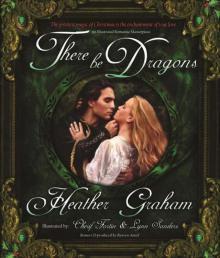- Home
- Graham, Heather
There Be Dragons
There Be Dragons Read online
Table of Contents
Gallery of players
Prologue
Return to a time of Magic
Chapter 1
Chapter 2
Chapter 3
Chapter 4
Chapter 5
Chapter 6
Heather Graham
Fortin & Sanders
Published 2009 by Medallion Press, Inc.
The MEDALLION PRESS LOGO
is a registered trademark of Medallion Press, Inc.
Copyright © 2009 by Heather Graham
Artwork by Cherif Fortin and Lynn Sanders
Cover design by Adam Mock and James Tampa
Book design by James Tampa
Bonus CD produced by Reuven Amiel
Costumes by Connie Perry
All rights reserved. No part of this book may be reproduced or transmitted in any form or by any electronic or mechanical means, including photocopying, recording, or by any information storage and retrieval system, without written permission of the publisher, except where permitted by law.
Names, characters, places, and incidents are the products of the author’s imagination or are used fictionally. Any resemblance to actual events, locales, or persons, living or dead, is entirely coincidental.
Printed in the United States of America
Typeset in Adobe Garamond Pro
Library of Congress Cataloging-in-Publication Data
Graham, Heather.
There be dragons / Heather Graham.
p. cm.
ISBN 978-1-60542-071-4
I. Title.
PS3557.R198T54 2009
813’.54--dc22
2009005945
10 9 8 7 6 5 4 3 2 1
First Edition
ACKNOWLEDGMENTS:
To all those who made this such a fun and wonderful project, Bryee-Annon, Chynna, Jason, Shayne, and Derek Pozzessere, Yevgeniya Yeretskaya-Pozzessere, Helen and James Rosburg, Ali DeGray, Patric Falcon, Abdiel Vivancos, D.J. and Graham Davant, Franci Naulin, Teresa Davant, Al Perry, Alicia Ibarra, Bobby and Victoria Sophia Rosello, and very especially Lynn Sanders, Cherif Fortin, Reuven Amiel, and Connie Perry.
Prologue
Legends
Once upon a time, before the world of man was as old as it is today—but after it was as young as it might have been—there was a beautiful land called Calasia, caught between the new age of logic and the ancient days of magic. It was ruled by the great Duke Fiorelli, and beneath him, in power in their feudal lands, were two renowned warrior counts, the lords of Lendo and Baristo. Calasia, governed by the great Duke Fiorelli, prospered, laws were just, and art and music were loved and enjoyed.
But to the south lived the fierce People of the Distant Land, and when they threatened the borders of Calasia, three great warriors, the leaders of the land, went out to meet them. It had been some time since such an enemy had been met, and those who went rode to fight hard indeed, for it was said their enemies had among their ranks a group of great, tall, dreaded wargnomes, beings said to have armored skin, reptilian scales that gave them the ability to defy the swords and arrows of mortal warriors.
Hectobar, one of the horrid battle lords who led the enemy forces, was known to have stolen a princess from a nearby realm. Being gallant knights, the noblemen of Calasia would not only protect their borders, but they would not stop until they had freed the beautiful damsel in distress. So they rode, and a great battle ensued.
In the midst of the fighting, Alphonso, Count of Lendo, was caught in a tight arena of terrible combat. He could not be reached by his old and dear friend, Fiorelli, and later, the Count of Baristo would claim he was too far from the fighting to go to Alphonso’s aid. And so it was that Nico d’Or, falcon master to the Count, came into the picture. Brave and courageous, he rode forward, fought relentlessly, and smote the enemy to free the Count of Lendo from the evil hordes surrounding him. But alas, the Count of Lendo had received a mortal blow, and in the arms of his falcon master, he found his last strength and comfort. He commended the keeping of Lendo to Nico d’Or, the falcon master, who had proven his strength and loyalty.
As the Count of Lendo placed all he held dear in d’Or’s keeping and sighed his last breath, Nico d’Or rose with a great heartache and a roar of fury, swearing the fine old count would not die in vain.
The knights of Calasia joined in his rage, rallied, and rode on with great speed. They came upon the horrid creature Hectobar, who still held the feisty princess. So great was d’Or’s fury, he hopped atop the creature Hectobar, and, with his bare hands, strangled the beast.
The princess, Elisia, impressed by the mighty knight who had saved her, had no desire to be returned to her home. The great Duke Fiorelli thought it was only natural that the princess be granted to the brave falcon master, Nico d’Or, and that the brave fellow indeed be given the lands and title of Lendo. This was an easy ruling for the great Duke Fiorelli, for he was a married man himself, with a lovely duchess who had given him a fine and hearty son for an heir, as well as a lovely daughter.
Now, it should have been quite acceptable to Marco, Count of Baristo, as well, for he, too, had a countess, Geovana, and a son. However, it was rumored his wife was a witch. She had come from the dark lands to the northeast of the lovely peninsula on which they all lived. Many believed that if his wife was indeed a witch, it was entirely his own fault. The Count of Baristo was an ambitious man, fond of fine living and improving his own holdings, and he was disgruntled. The falcon master was given a beautiful, sweet, wealthy bride, and he was returning home to …
Well, his not so sweet, lovely, or wealthy bride.
Despite his displeasure, there was nothing the Count of Baristo could do, except, of course, return home to his countess, Geovana, where the poor man discovered his wife was far more unhappy than he!
Furious that he had not been the one to rush to the aid of the Count of Lendo, she added to his woes. Had he done so, the charming village and rich and fertile lands of Lendo might have been granted to him, rather than being bestowed upon—of all people!—the falcon master. (To add to Geovanna’s disappointment, certain rumors reached her regarding her own husband, namely that he, too, had been quite infatuated with the rescued princess, Elisia.)
However pleased or not pleased as they might be, Nico d’Or was to marry Elisia.
The night of the formal wedding announcement, Geovana’s servants heard her upon the balcony. Dressed in the black she chose for just such occasions of dark and deadly mood, she stood outside, reaching upward to the sky, chanting. Her voice rose and fell in a strange and uncanny sound of fury. Her cries rose with a vengeance. There was a terrible storm that night, and many thought the sound was the whipping of the wind and the crackle and boom of the thunder.
Long after midnight, the Countess at last came in, calm and serene, and strangely pleasant to all those around her. The people marveled that she had, it seemed, realized the wealth of her own position, and the blessings of her son and husband.
The next morning was when the dragon appeared.
It was beautiful in its wickedness, royal purple and midnight black in color, winged and frilled, with huge dark eyes, a shimmering long tail, and a sharply pointed spine.
The day was rough, with lightning flashing again and again, and storm clouds sweeping the sun away. Some thought they imagined the creature, but when the princess Elisia came to stand upon the balcony at Lendo, dressed in her wedding finery, the dragon came down and swept her away.
It was quite odd that—when she heard the news—Geovana, along with her cries of, “Oh, no!” and “Oh, dear!”—appeared to be either secretly smiling or smirking.
Nico d’Or, the new Count of Lendo, was distraught, and followed a trai
l, it is said, of blue smoke. The trail took him high upon the cliffs, where great crags and caves were in abundance. He had gone alone in his haste and desperation that no harm should come to his princess, his only weapons a sword and strength of will.
Legend says it was pureness within his heart, along with his fear for the life of another, that led him straight to the dragon. Though he did not see the creature die, he was certain he had inflicted a mortal injury upon the beast. At the least, he wrested his princess free.
In Lendo, all rejoiced. The wedding would be that night, as planned.
But that very same night, the Countess of Baristo apparently suffered a fall or some injury. Still, she was determined to attend the wedding. She dragged herself from her sickbed. For the occasion, she even doffed her habitual black shade of dress, and arrived in shining white in honor of the pair. After the ceremony, she kindly cast a spell for the newlyweds, one that granted love and happiness for all the time they might have together.
As a married couple, Elisia and d’Or were happy. Deeply happy, deeply in love.
Indeed, Geovana had cast such a spell. She neglected to tell the couple, of course, that her spell had included the fact that their happy time together would not last more than a decade.
Life went on. Elisia and Nico, Lady and Lord of Lendo, found happiness in themselves, and though they rued the lack of a child, they worked hard for those around them.
In time, however, they were distressed to hear about the death of their neighbor, the Count of Baristo. They sent their deepest condolences to the Countess Geovana, and sent servants with food and priests to pray for the dear deceased’s soul. The Countess, however, was inconsolable (many said, “Rot!”), and though none knew why, she blamed the happy couple for the death of her husband. Many thought her grief quite exaggerated, for it was whispered that the two had argued most vociferously, and that even the stone walls of the castle were known to shiver by night.
However, in the wondrous haven of Lendo, Elisia and Nico lived in a delightful world of love and peace. The only thing lacking was a child, the deepest desire of both Elisia and her count.
Then a baby girl was at last born to the couple. She was called Marina, for her parents both so dearly loved the sea.
The rejoicing in Lendo was quite incredible, because the people lived in such peace and harmony. There were so many gifts! Beautiful gifts! Most of them.
The Countess Geovana of Baristo sent a rather unusual present. It was quite lovely, but rather large for a tiny infant. It was a bed, beautifully carved, with a soft mattress and elegant silk and velvet trappings. It came with the suggestion that her son and their daughter should become betrothed, and marry at the appropriate time.
Now Nico and Elisia had become well aware by that time that the Countess Geovana did not always intend the best for others. As politely as they could, they hemmed and hawed and suggested they must let the children grow older, and see if they were at all compatible. Geovana seemed to accept their words; she smiled, and raised a glass to them, and murmured something beneath her breath. She touched the bed, and oddly, upon the elegant trappings, she set a stone. All for luck, of course, she told them, and it was only later, late at night, sleeping by the side of his lady, that Nico d’Or remembered that luck could be good—and quite bad, and so he removed the stone from the bed.
For a few years more, all was a most wondrous fantasy in Lendo. Then … tragedy.
The Count awoke one morning feeling fine. That night, however, a storm rose. It was said that the wind had the sound of a woman’s screams. The good Count d’Or went among the villagers, helping them gather their livestock into the safety of the walls. And as they came through an archway, a stone fell, striking the Count on the head.
His countess raced through the driving rain. She wrapped him tenderly in her arms. The finest physicians were called, the greatest wizards. But all to no avail.
The brave and kindly count departed his wondrous world. As he died, the clock struck twelve, and seemed to toll out a misery all its own. At the last stroke, the sky, cleared then of the rain, was filled with stars that created the shape of a magnificent, flying steed. Some of the people found peace in the beautiful sight, for they believed that the Count, risen from the status of falcon master, had found his soul borne away by magical wings, and flown in such a soaring fashion to heaven.
Elisia was inconsolable. But Duke Fiorelli came to see her when an appropriate time had passed, telling her that she must marry again, for the People of the Distant Land were ever ready to ride hard and take what they could. She mentioned to him that Count Baristo’s widow had not remarried, and even the great Fiorelli was perplexed. He was loathe to admit to the sweet and beautiful Elisia that he knew of few knights or noblemen brave enough to wed the Countess Baristo.
In time, it was arranged. And it was actually through the Countess Geovana that Elisia met the Count d’Artois, a handsome man from the Place of Misty Mountains and Legends, where Geovana herself had been raised. He had a daughter near the age of Elisia’s own dear Marina. (Some thought it strange that Geovana had not sought out this knight for herself; others noted that Geovana often had ever-so-slightly devious long-range plans.)
And so, once again, wedding bells rang out and pealed across the hills and cliffs of Lendo.
People came from far and wide. All rejoiced, and it seemed that even the Countess Geovana was at peace, for she arrived once more dressed in splendid white, bearing many gifts (that were actually quite normal gifts, silver and plate). She danced and laughed at the ceremony, and she was, in fact, so charming and lovely that Duke Fiorelli began to believe he might, after all, find the widow a new husband.
In Lendo then, it seemed, there would be peace and strength and prosperity, until …
Once again, a storm rose. And it was quite bizarre, for the Countess Elisia was sleeping in her own bed when a stone flew straight into the bedroom, borne on the wind. It struck her on the head.
Within a fortnight, she, too, passed away. She did so as had her dearly beloved Nico, at the stroke of twelve. When the clock echoed with its last chime, the heavens cleared again and the stars formed the shape of a magnificent, magical falcon. The people whispered that her soul had been taken through the stars to join with Nico’s. True or not, it made for a lovely legend.
Lendo was cast into a deep mourning, for Elisia had been so dearly adored by her people.
The talk around the countryside became, with the passage of time, quite practical. Thank goodness that the Countess had remarried, for Lendo was, at least, left with a new lord.
There was always danger on the wind. The People of a Distant Land might send raiders again at any time.
And then again, they did, indeed, live in a time of dragons …
Years passed.
Fire and danger forever threatened.
Even when the beauty of peace of Christmastide came near.
Return to a Time of Magic
Chapter 1
Marina was awakened by a thumping sound in the back courtyard below her window. She rose quickly, and walked to look out.
And there he was.
Armand, out before the dawn, battling it out with the scarecrow.
Unfortunately, it appeared that the scarecrow was winning. Armand was clad in mail, mask down on his helm. Apparently, he’d been on his horse, Ares, practicing with his sword against the dummy set in the yard, a place where all the fighting men and knights might hone their skills at thrusting hard against the enemy.
Armand had missed the scarecrow.
With his impetus, he had left his seat upon Ares.
His well-trained mount waited a distance from Armand, as if he was determined not to look at his master in his distress, and hopefully, save him any embarrassment. Armand was now sitting on his rear, hands upon the ground, shaking his head. A moment later, he lifted his visor, then removed his helmet, and saw his cousin looking down.
He scowled for a moment, then sighed
. “Honestly, I believe that scarecrow moved!” he told Marina.
She gave him a warm smile, feeling a soft sigh in her own heart. Armand was so determined. “Give me a minute; I’m coming right down. Did you hurt yourself?”
He tried moving. “No—I’m afraid that my rear section is quite accustomed to hitting dirt,” he said.
Marina turned from the window, caught up her cape, and came running down the spiral staircase to the back. Once, her room had been in front of the house d’Or, and her windows had overlooked the garden. She scarcely remembered that time, and she didn’t particularly care that she had been relegated to the rear, overlooking the practice courtyard. She enjoyed riding herself, and learning by all that she watched.
When she reached the courtyard, Armand was still dusting himself off. “Ares, are you sure we rode quite straight?” he demanded of his mount.
The huge horse, granted to him because of his status as falcon master, after his own uncle and then father, raised and lowered its handsome head, as if speaking to him in return and assuring him he had done his best.
“Armand, you’re the finest rider I know. Honestly, there is no reason for you to become a great warrior.”
“There is every reason,” he assured her. He walked toward the well, drawing up the bucket and ladle and drinking thirstily. Marina followed him, and Ares ambled along, as well.
“Armand—”
“Marina, I can prove that I’m a worthy suitor for Daphne. I can make the Count d’Artois realize I am an incredible asset to him, and that I should be allowed to love his daughter.” He started to say more, then hesitated. He set the ladle back in the water bucket and looked at Marina again. “He intends to have you both married off within a fortnight, you know.” He made a face. “Christmas weddings. How lovely.”
Marina gritted her teeth against the shudder that swept through her. Christmas. A time she loved so much, with carols in the air and the holly decorated with bows, mistletoe here and there, and all the pageantry. A time of peace and beauty. A time to be thankful.

 There Be Dragons
There Be Dragons And One Rode West
And One Rode West MacAuliffe Vikings Trilogy 3 - Lord of the wolves
MacAuliffe Vikings Trilogy 3 - Lord of the wolves Every Time I Love You
Every Time I Love You Fade to Black
Fade to Black